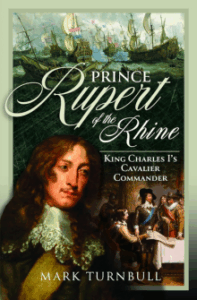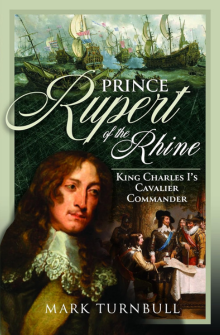Following his extraordinary study of Charles I’s private life, Mark Turnbull now turns his attention to another major player in the Wars of the Three Kingdoms, Prince Rupert of the Rhine. Those familiar with the tumultuous seventeenth century will be familiar with Rupert, son of Elizabeth Stuart (daughter of James VI and I, Electress Palatine and, briefly, Queen of Bohemia); Rupert is and has been well known, whether as a dashing cavalier famed for his good looks or as the infamous “Prince Robber” or “Duke of Plunderland”. But to what extent are his reputations earned?
In his approach to his subject, Turnbull’s Prince Rupert pulses with enthusiasm, and he is to be congratulated especially for making what is, by anyone’s measure, a fiendishly complex political and military situation, or set of overlapping situations, understandable. But this is not primarily a study of the age and its political fissures (which, by the middle of the century, had become gaping chasms fracturing Europe); the author knows the value of character study, and the various players (from King James and Elizabeth to the headstrong and martial-minded Rupert himself) emerge as understandable human beings. Central to Rupert’s life – and aided by Turnbull’s exceptional study of primary sources, which includes the decoding and study of hitherto untapped letters – were not only his fellow soldiers and male politicians but strong and politically-motivated women. Such figures as Rupert’s sister, Sophia (Electress of Hanover, from whom the royal replacements for the Stuarts descend) are captured in vivid anecdote: the princess recalling, for example, the exertions of a tutor who would brush her teeth rather too violently. In this way, the text is both revisionist and much-needed.
It is the personalities and relationships that elevate Prince Rupert above more conflict-focused military history. Although major battles are effectively and convincingly reassessed, the real joy of the book is its ability to breathe life into its key figures. Without lapsing into hagiography, Rupert emerges as neither the amoral dandy caricatured by English parliamentarian sources or the heroical royalist prince imagined by opposing forces. Rather, under Turnbull’s methodical reconstruction, he is a flawed man of genuine talent (in science, as when he invented a new quadrant, or in art, where his engravings remain as testament to his skill). He stands in a Europe (not just a Britain) thoroughly churned-up by politics and religion, and yet his interests are global, as witnessed in his early engagement in what might now be called race relations.
“Prince Rupert” will be of enormous interest to historians not just of the 17th century’s British conflicts but to anyone who enjoys exemplary historical research steeped in interpersonal drama.

Steven Veerapen is an academic and historian specialising in the 16th and 17th centuries and the author of Witches: A King’s Obsession.






